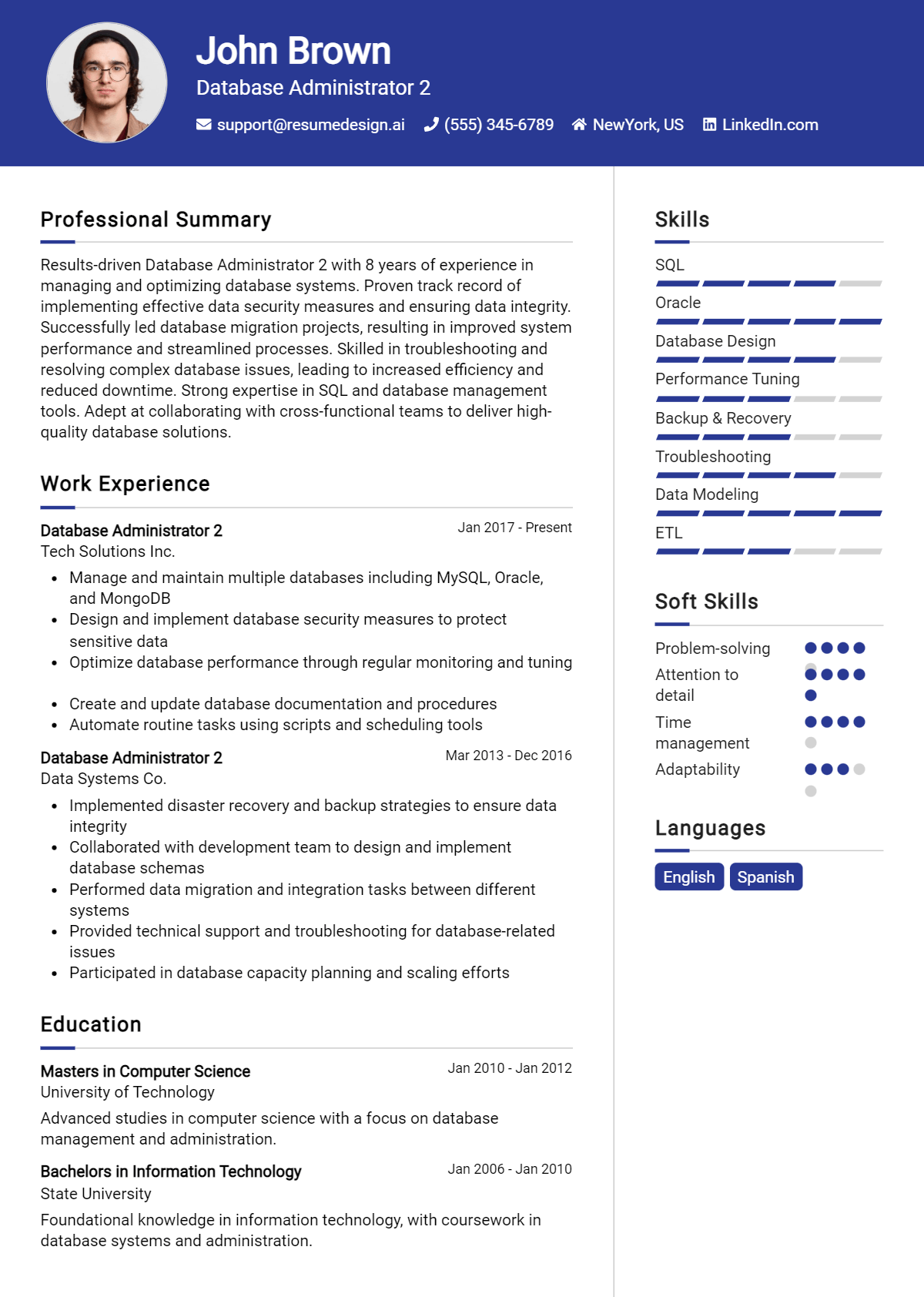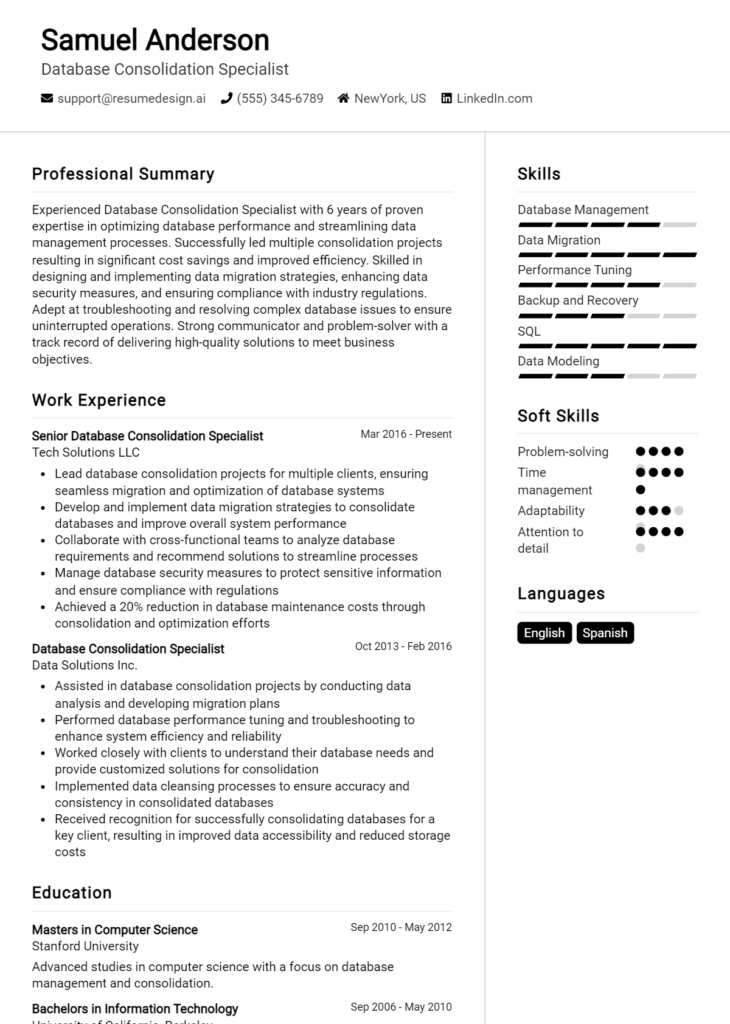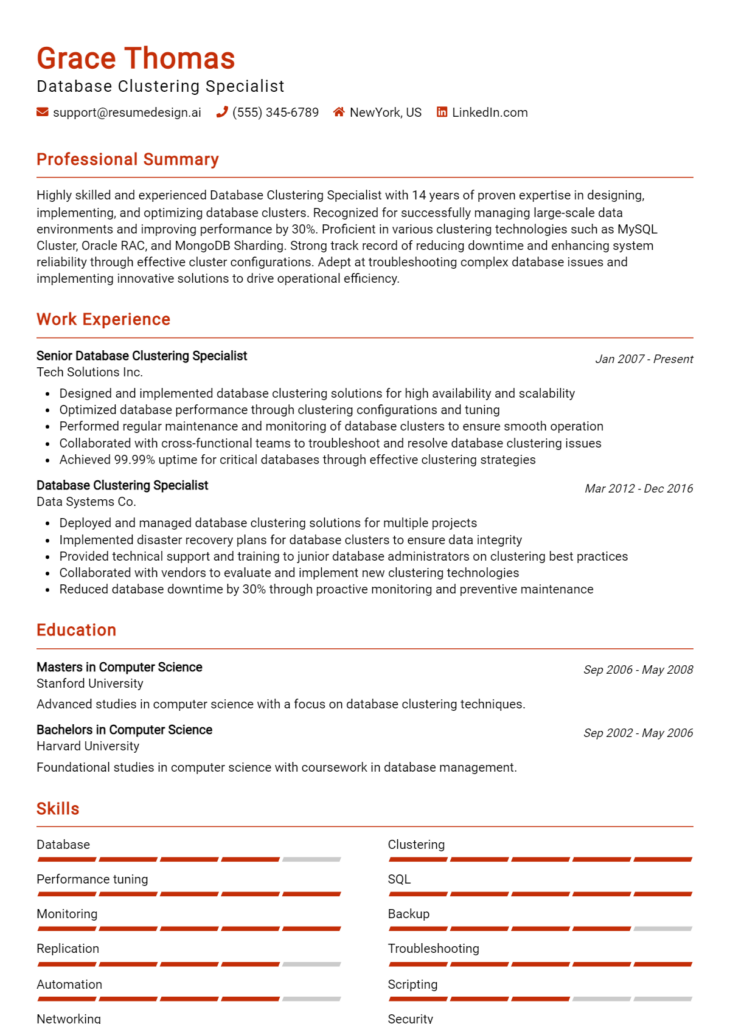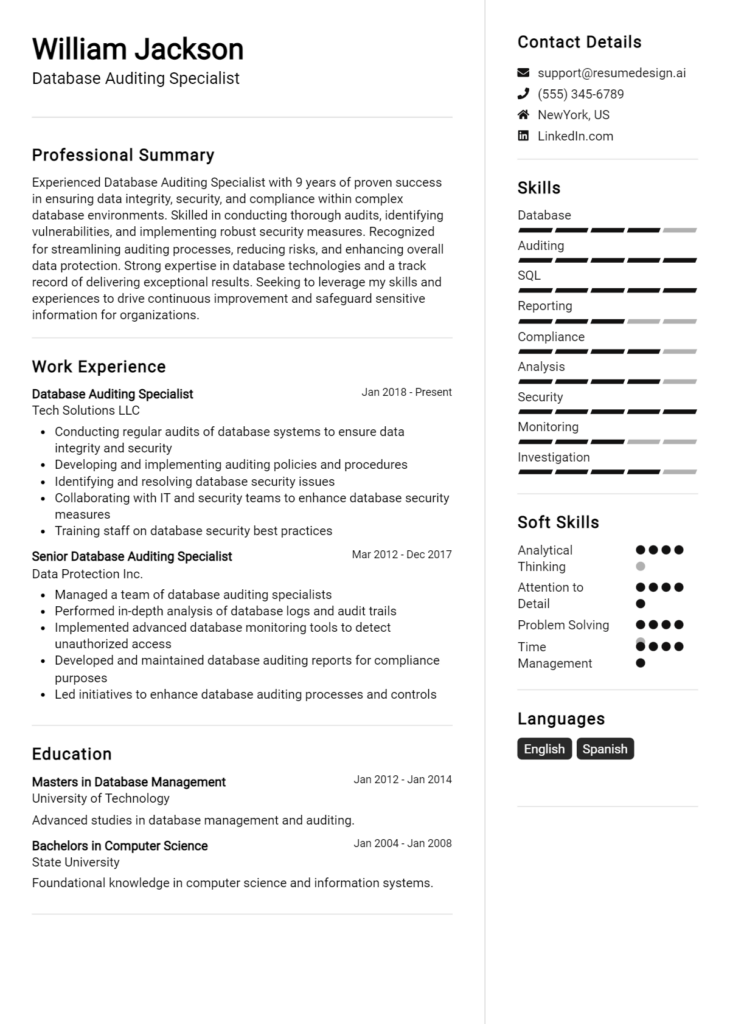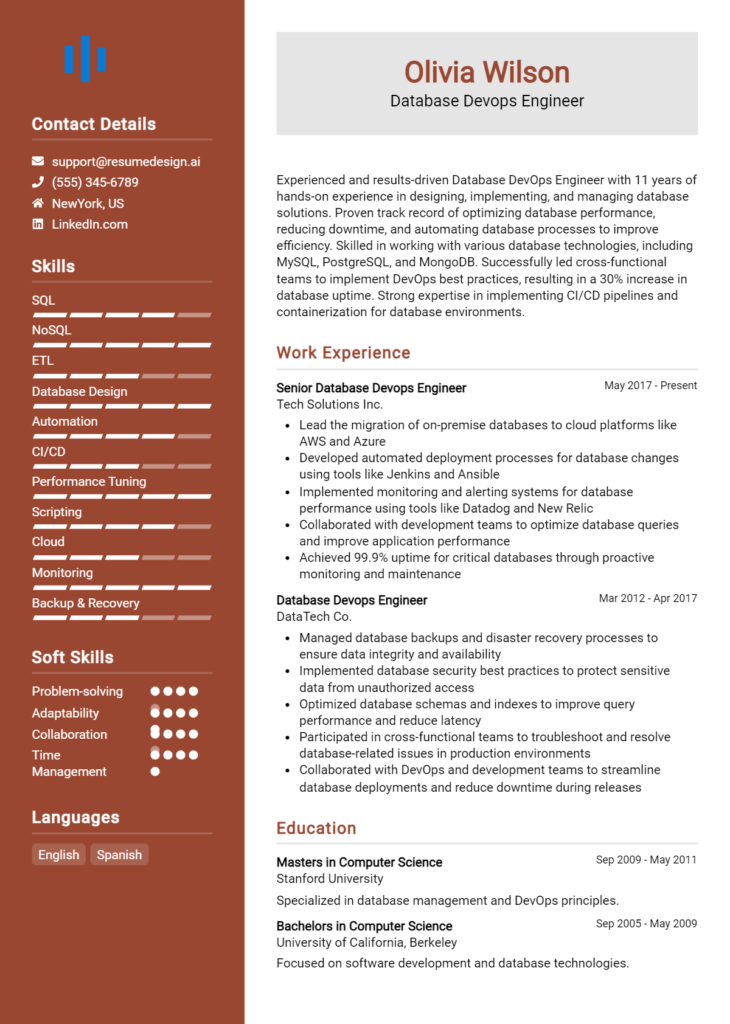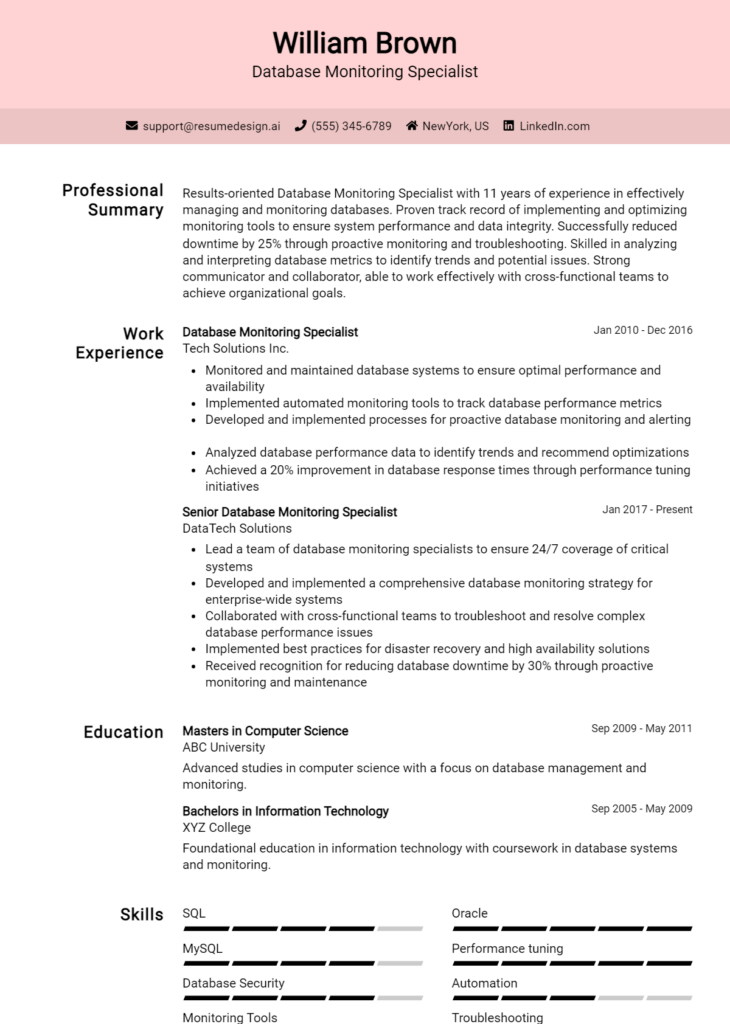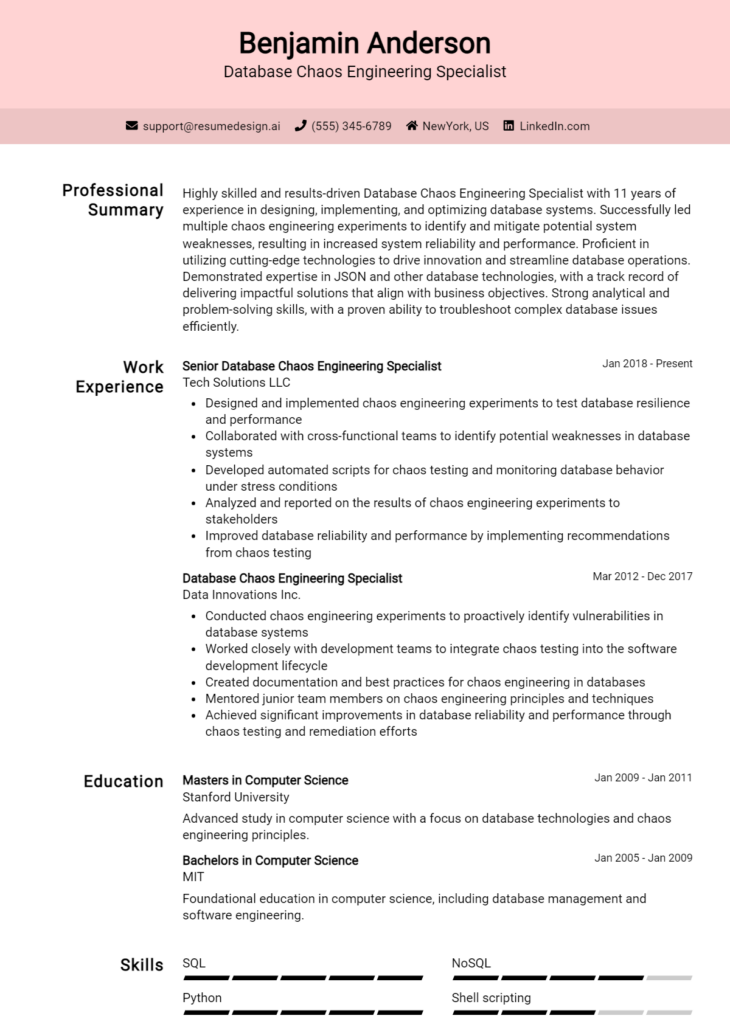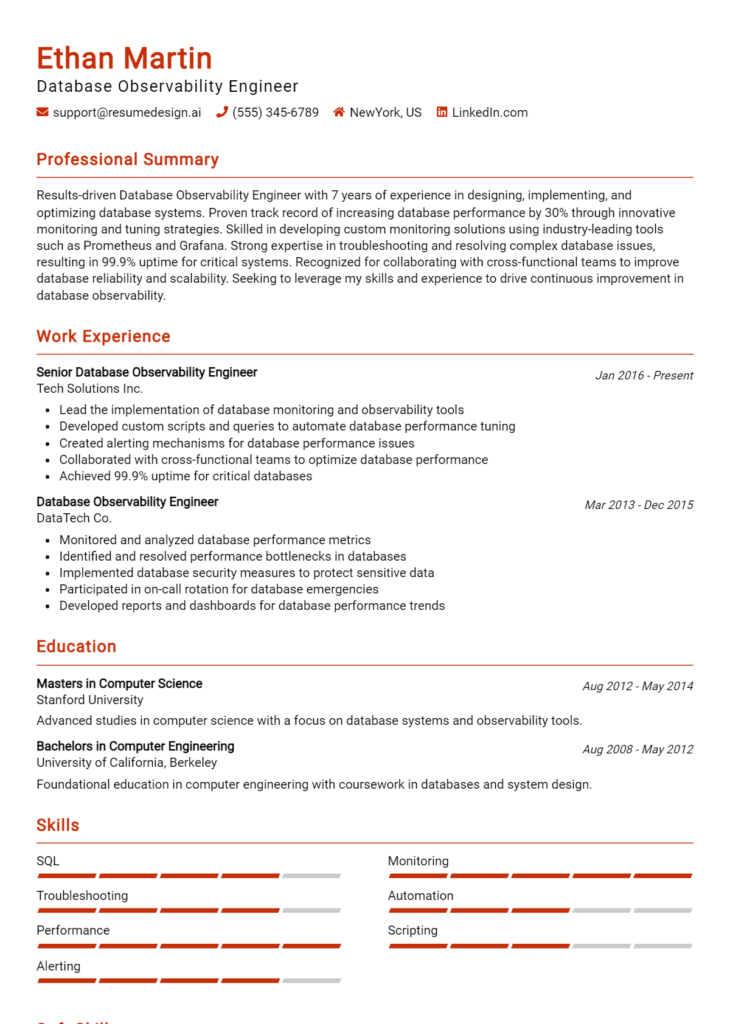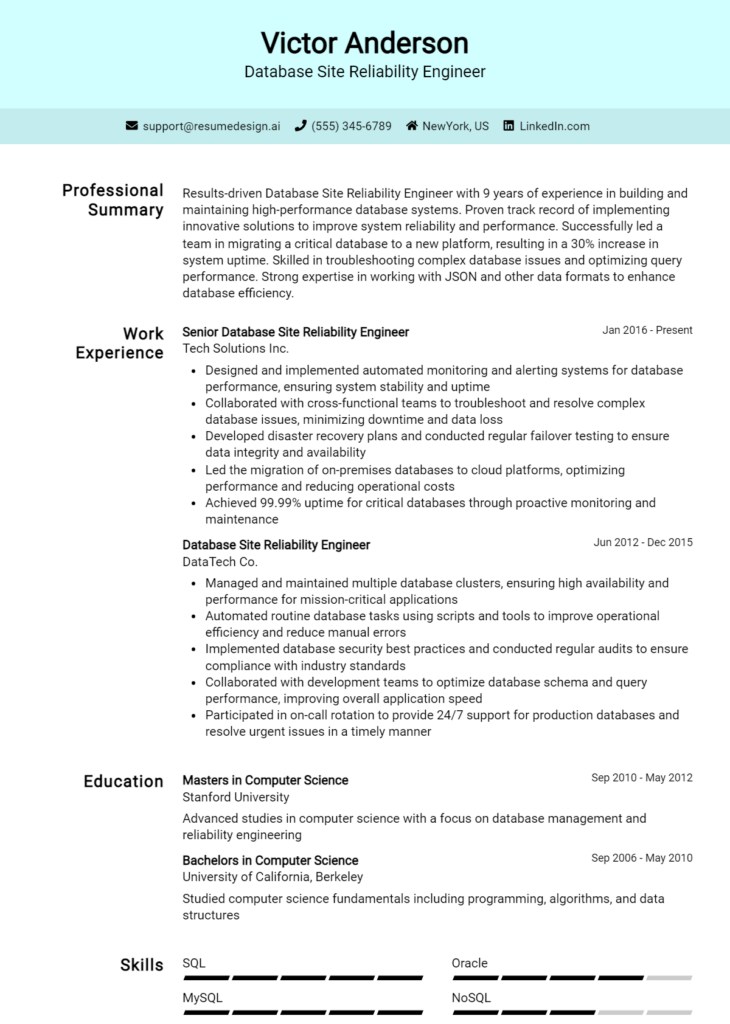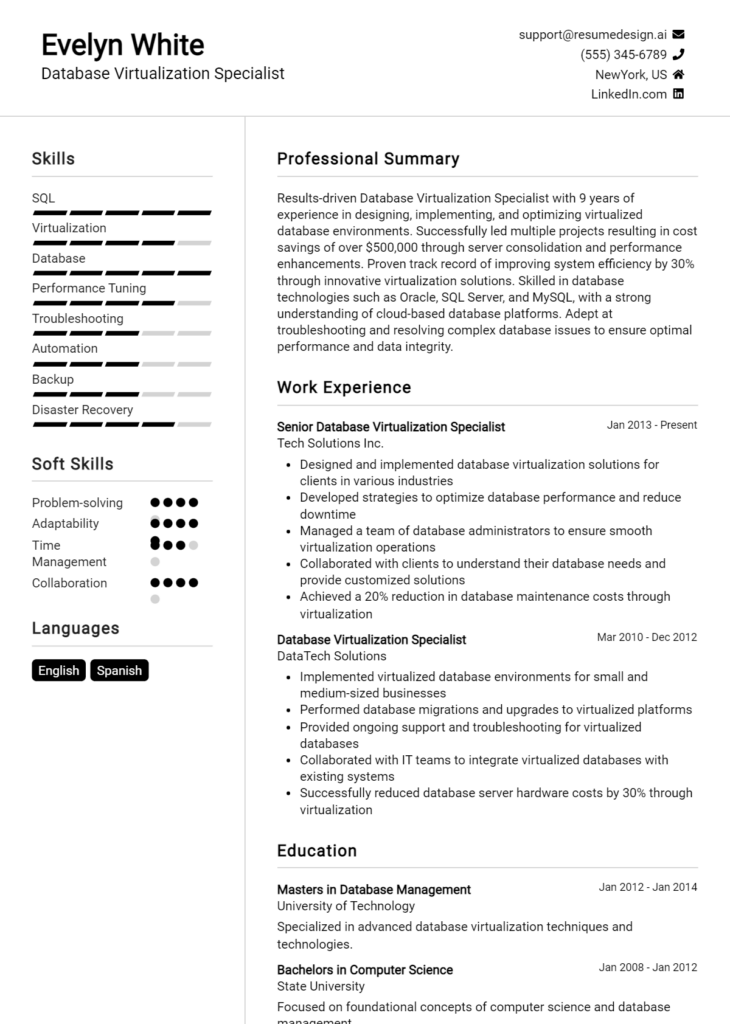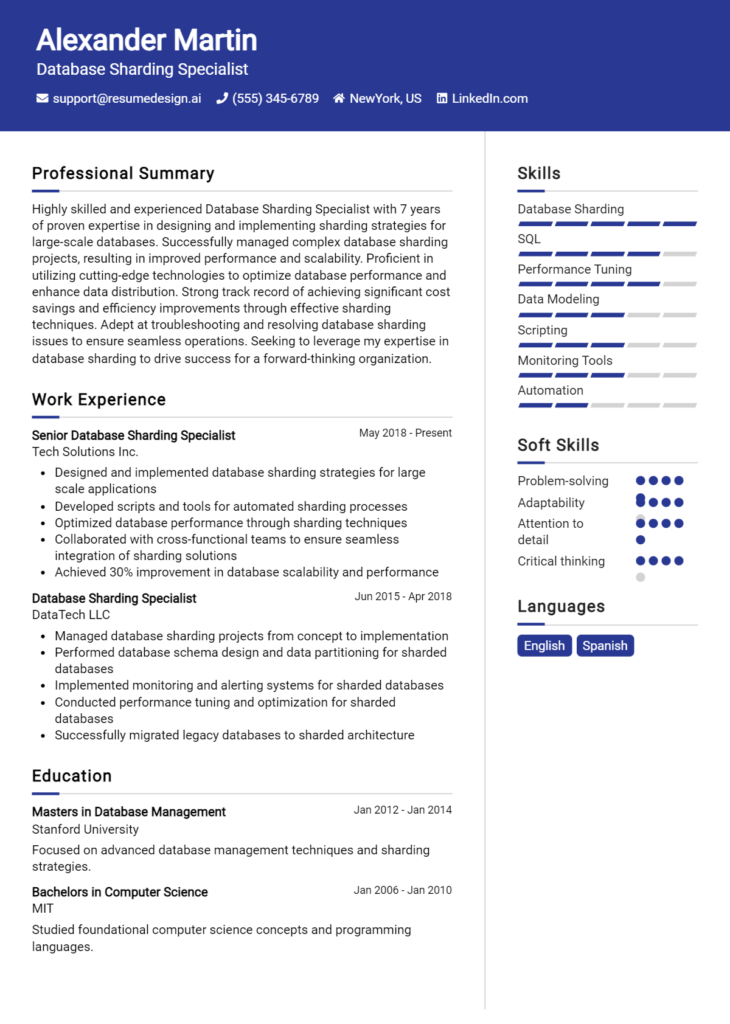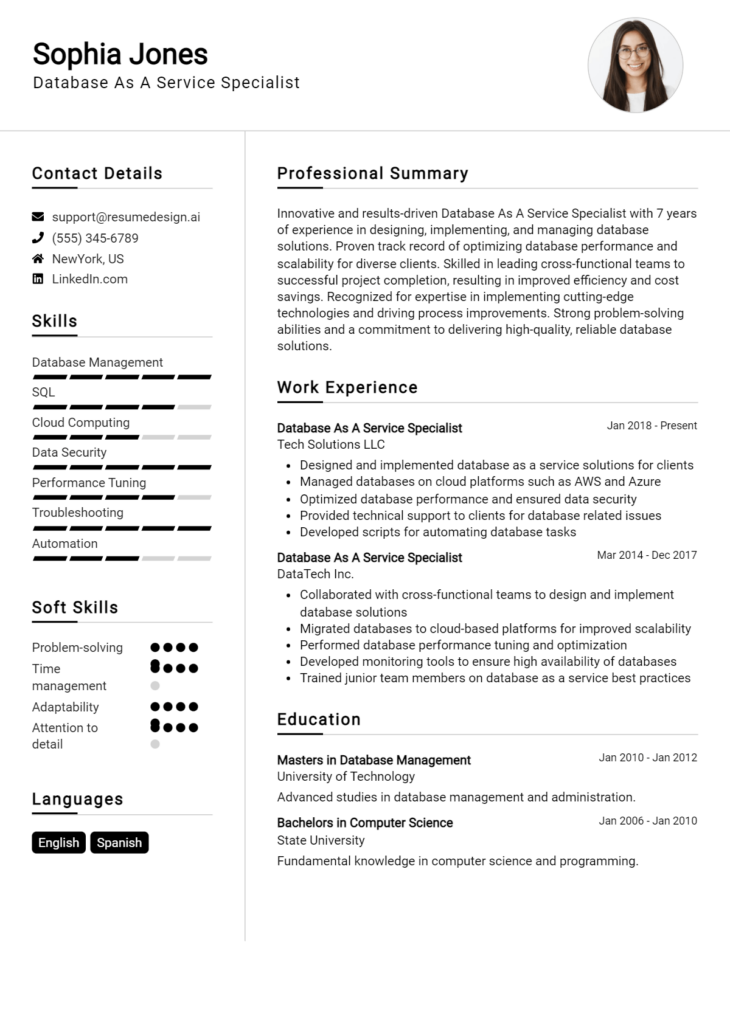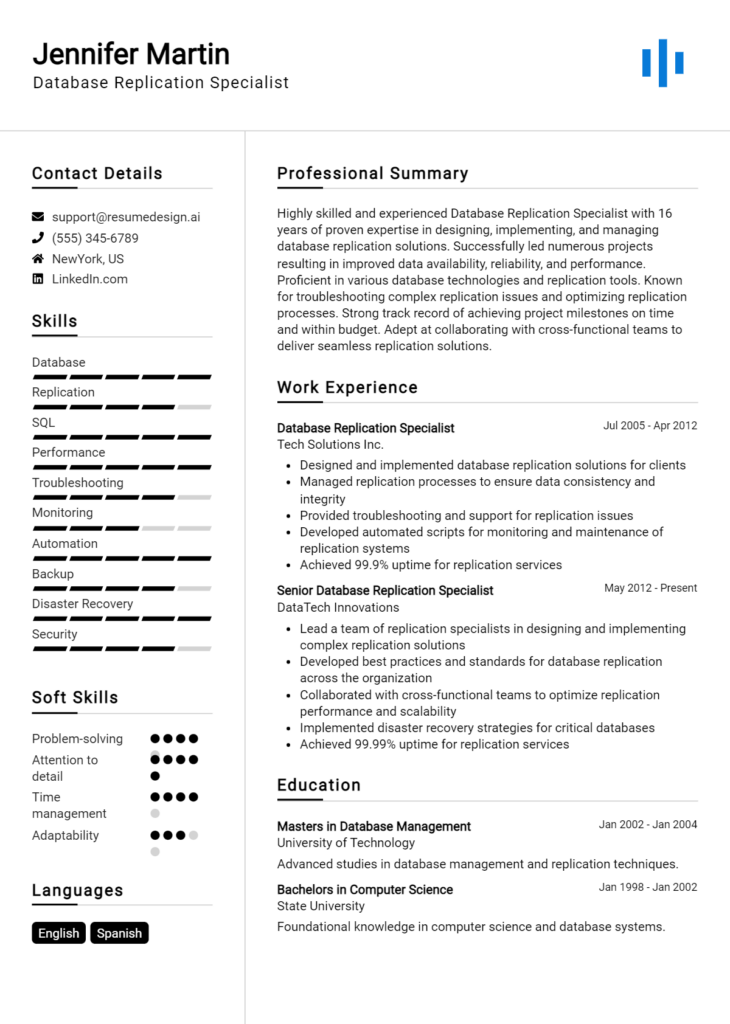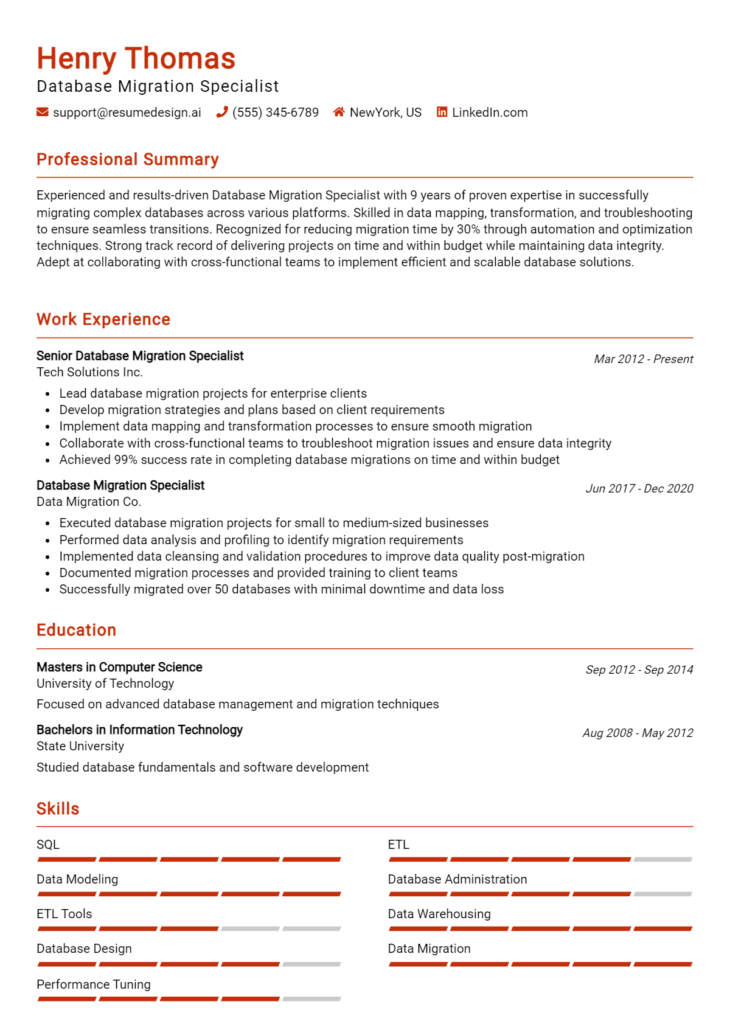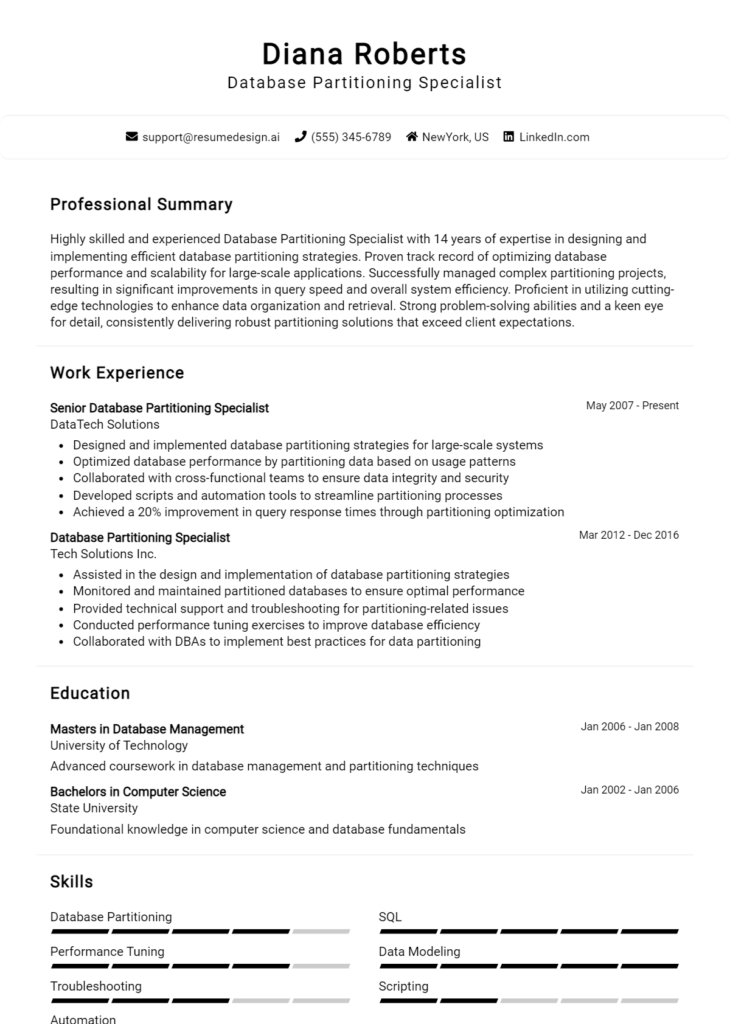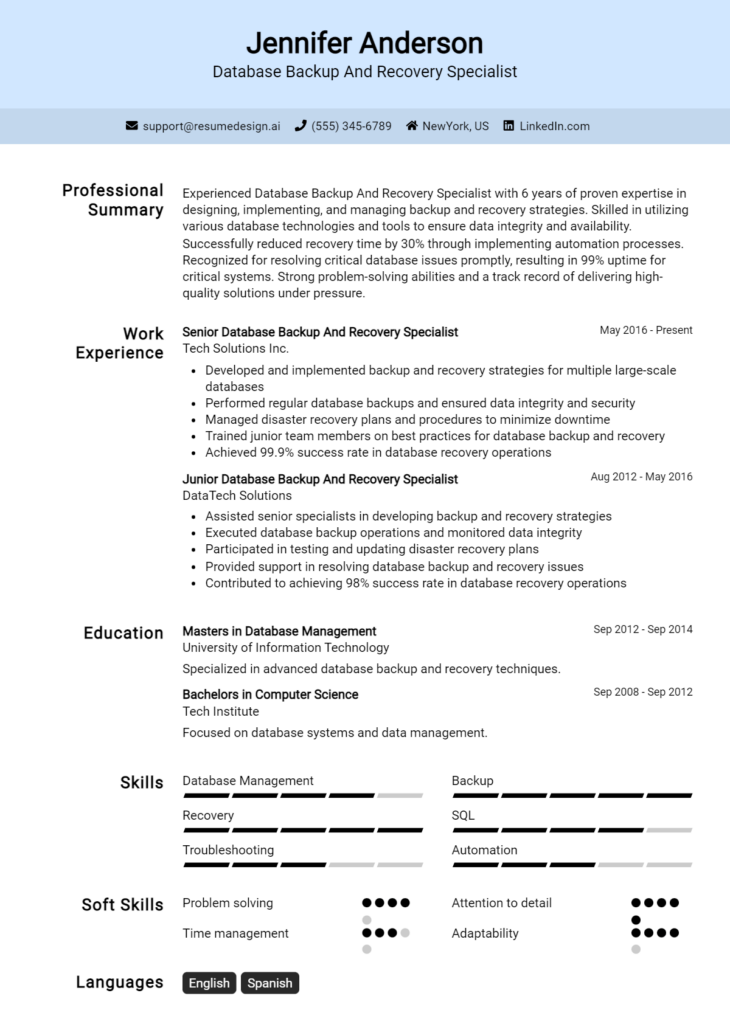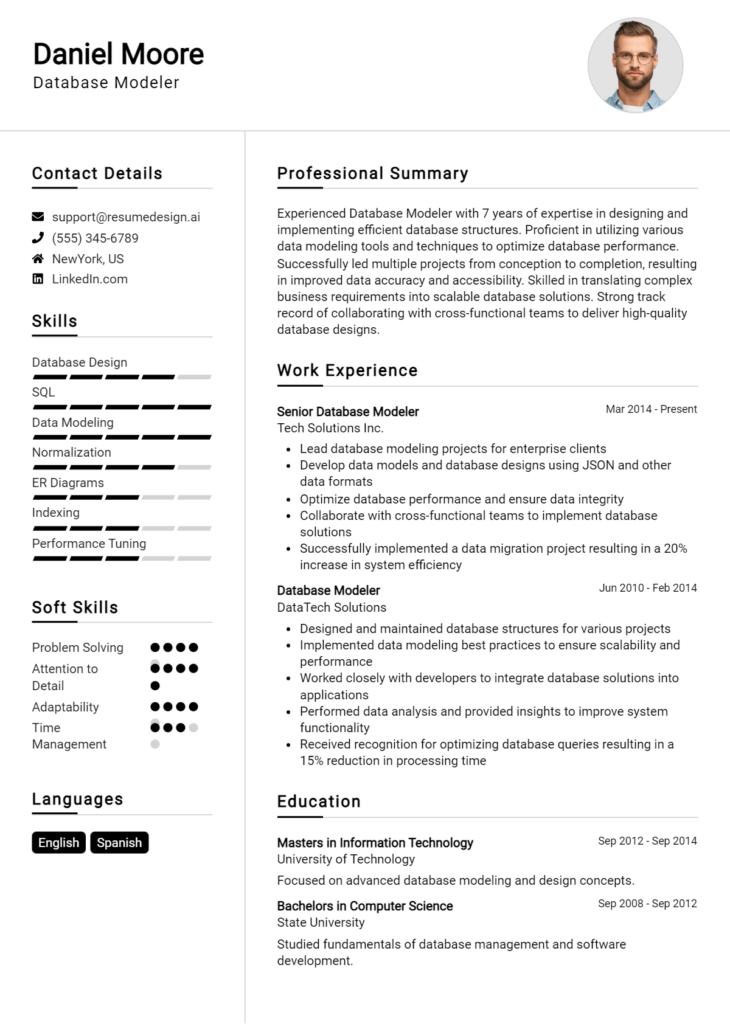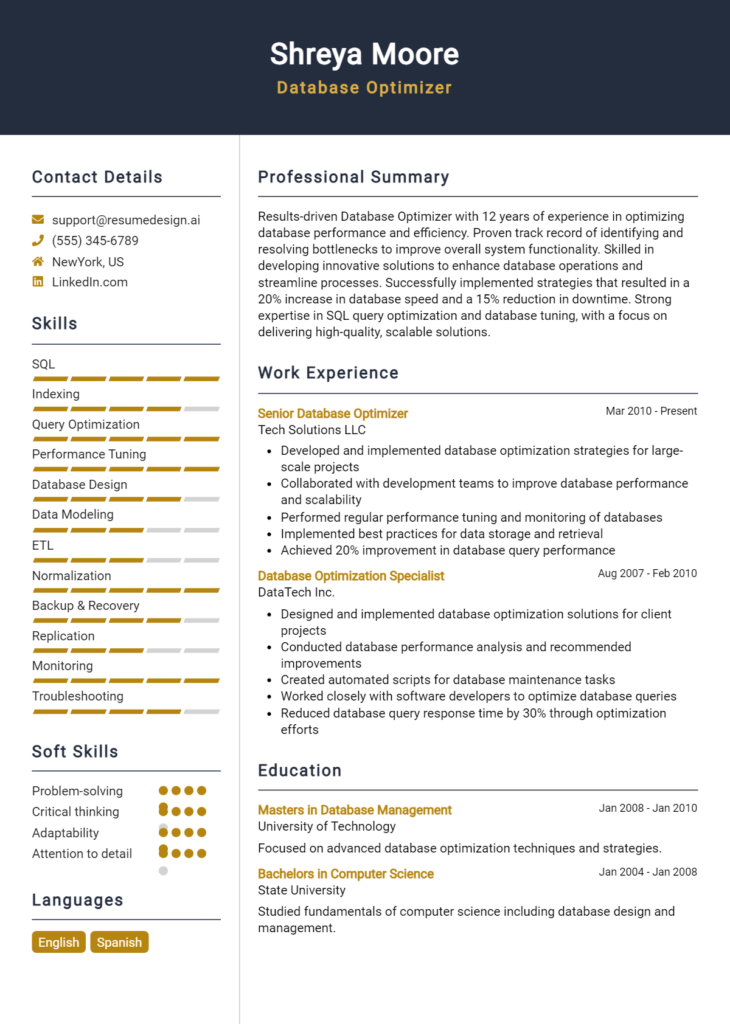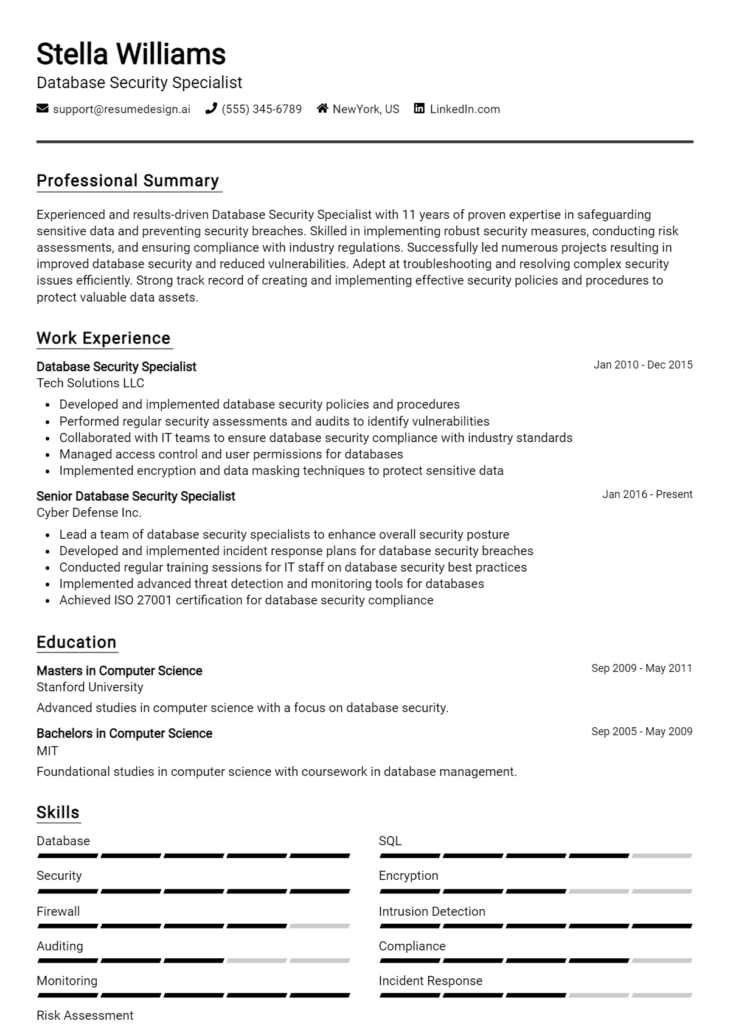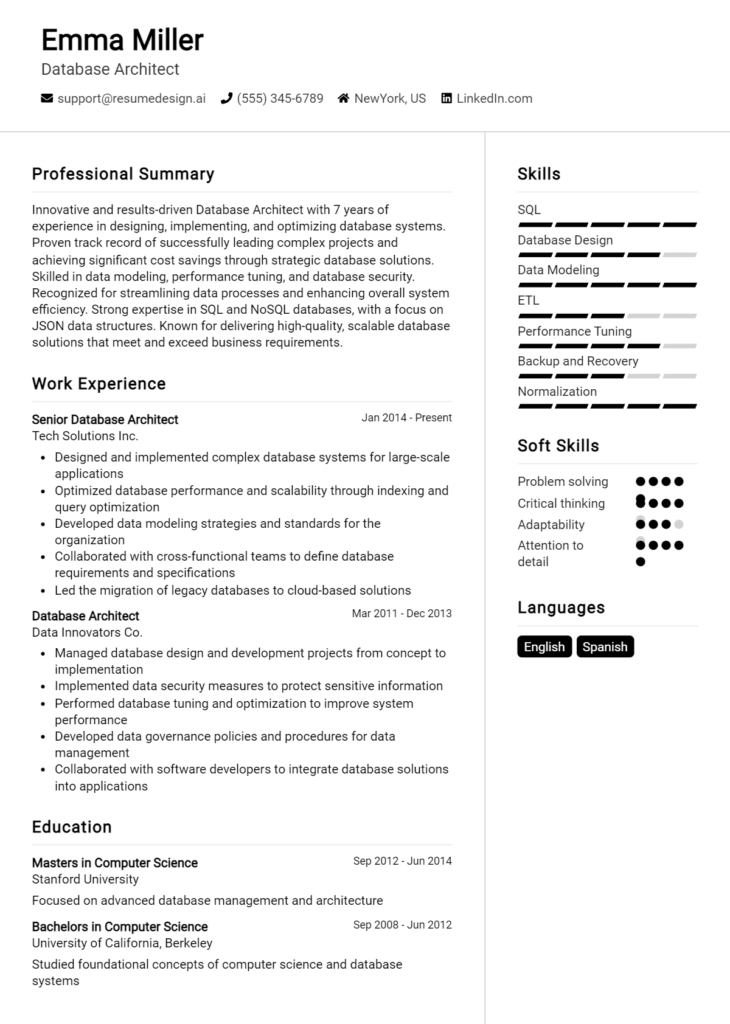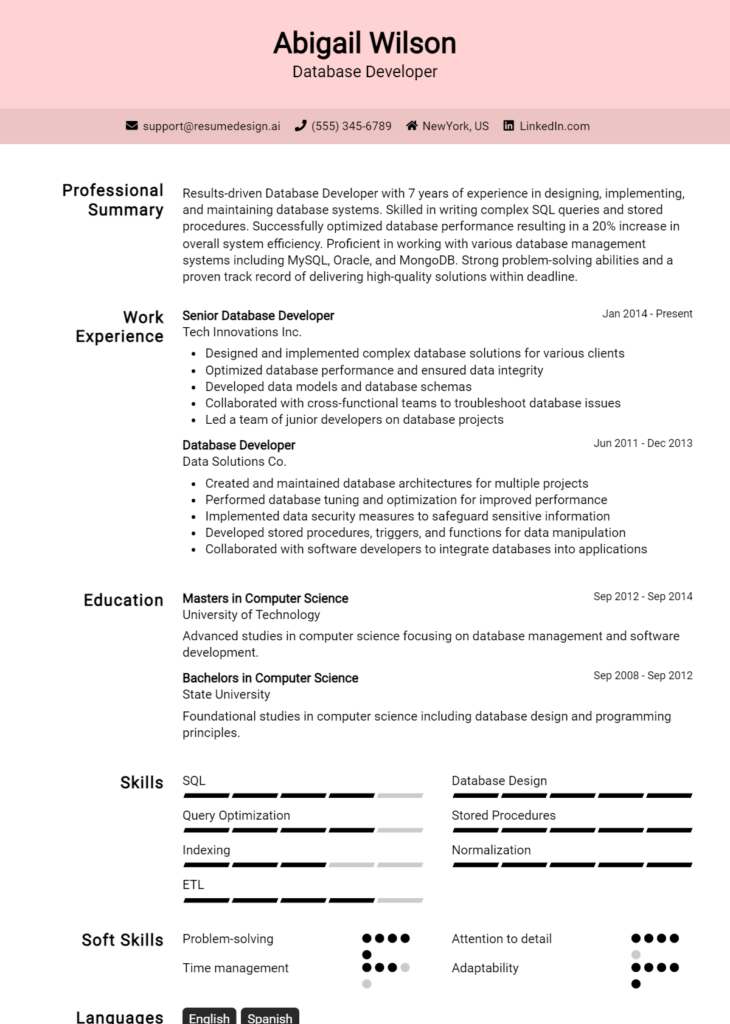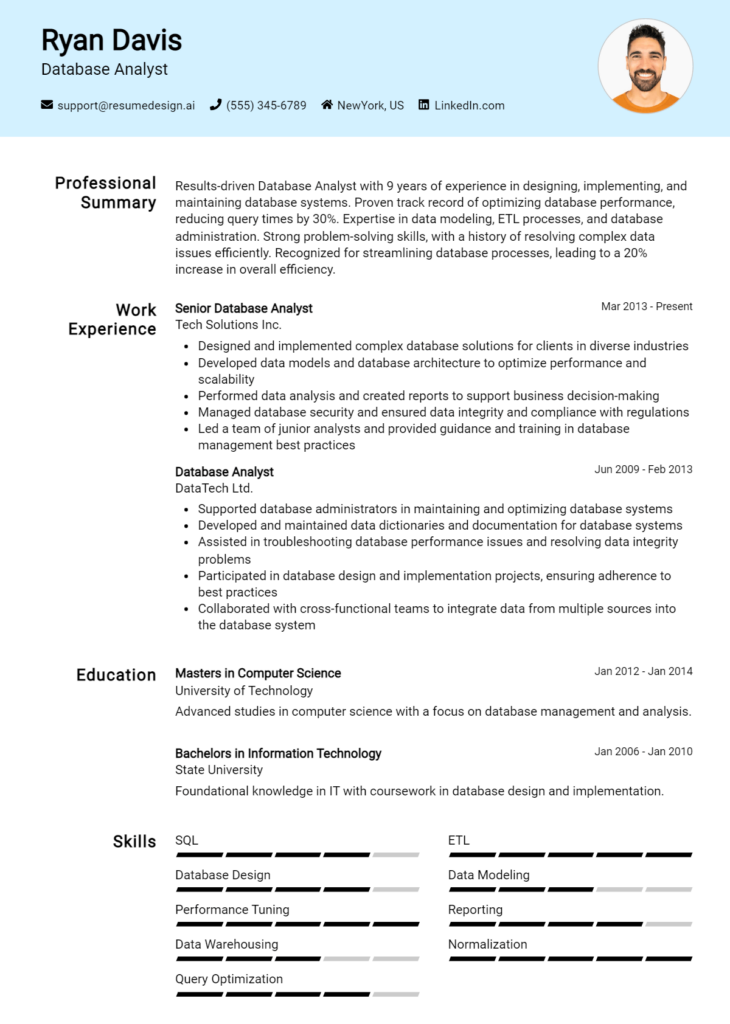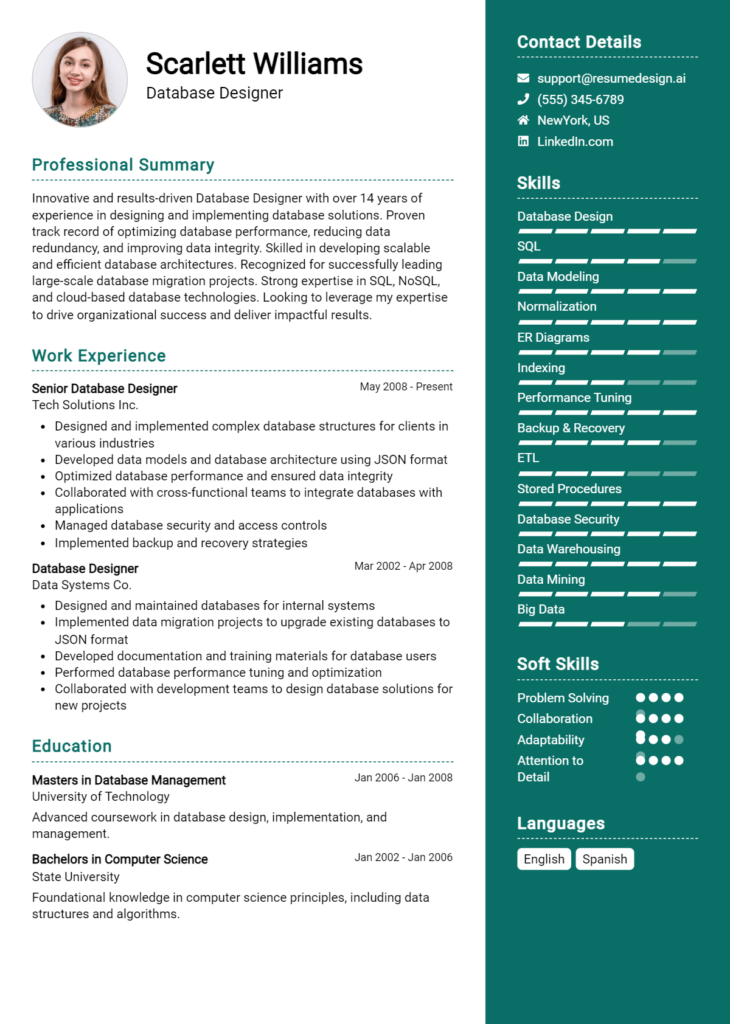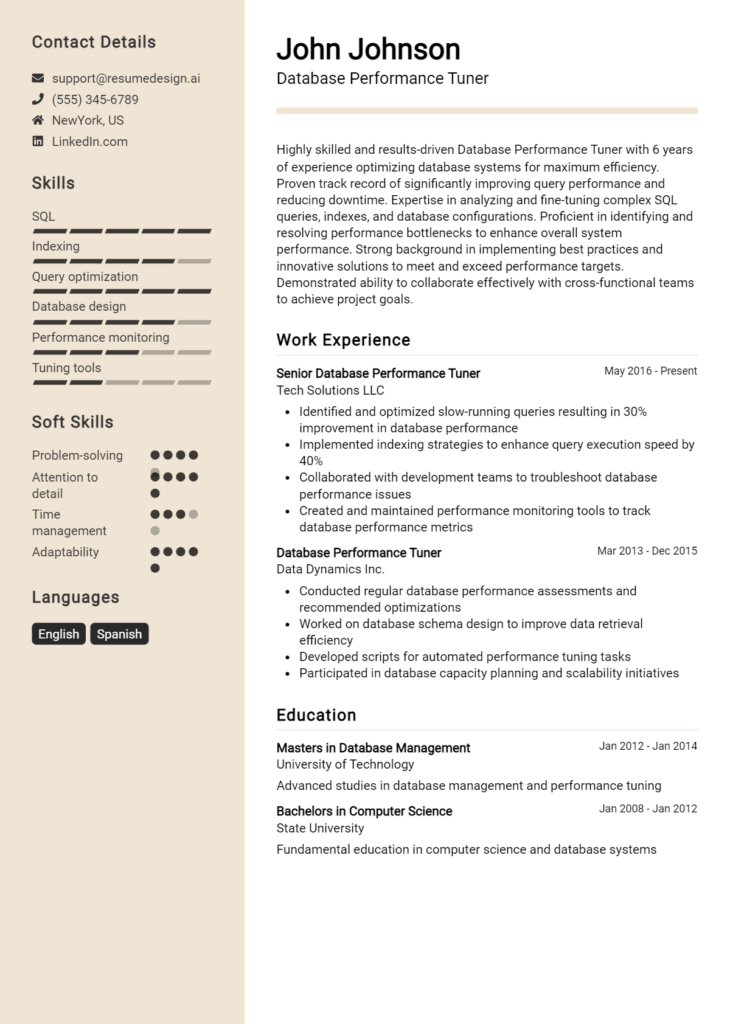Database Administrator Core Responsibilities
A Database Administrator (DBA) plays a crucial role in managing an organization’s data infrastructure, ensuring data integrity, availability, and security. This position requires a blend of technical expertise in database management systems, operational skills for routine maintenance, and problem-solving abilities to address data-related issues. DBAs often collaborate with various departments to align data strategies with business objectives, emphasizing the importance of these skills in achieving organizational goals. A well-structured resume can effectively highlight these qualifications, showcasing a DBA’s capacity to enhance data-driven decision-making across the enterprise.
Common Responsibilities Listed on Database Administrator Resume
- Designing and implementing database management systems.
- Monitoring database performance and optimizing queries.
- Ensuring data security and compliance with regulations.
- Backing up and restoring databases to prevent data loss.
- Collaborating with developers to design database schemas.
- Performing data migration and integration tasks.
- Providing technical support to users and troubleshooting issues.
- Documenting database processes and procedures.
- Managing database access and user permissions.
- Evaluating and implementing new database technologies.
- Conducting regular database health checks and maintenance.
- Staying updated on industry trends and best practices.
High-Level Resume Tips for Database Administrator Professionals
In the competitive landscape of database administration, a well-crafted resume serves as the critical first impression that can determine whether a candidate moves forward in the hiring process. For Database Administrator professionals, it is essential that their resumes not only showcase their technical expertise but also reflect their achievements and contributions in previous roles. A strong resume can effectively communicate a candidate's ability to manage, secure, and optimize databases, making it a vital tool in the job search. This guide will provide practical and actionable resume tips specifically tailored for Database Administrator professionals, helping them stand out in a crowded field.
Top Resume Tips for Database Administrator Professionals
- Tailor your resume to the job description by using relevant keywords and phrases that match the requirements of the position.
- Showcase your experience with specific database management systems (DBMS) such as Oracle, SQL Server, MySQL, or MongoDB, emphasizing your proficiency.
- Quantify your achievements by including metrics such as performance improvements, cost savings, or successful project completions to demonstrate your impact.
- Highlight industry-specific skills, including data modeling, backup and recovery strategies, and performance tuning techniques.
- Include certifications relevant to database administration, such as Microsoft Certified: Azure Database Administrator Associate or Oracle Certified Professional.
- Utilize action verbs to describe your responsibilities and accomplishments, making your contributions clear and dynamic.
- Keep your resume format clean and professional, ensuring it is easy to read and navigate for potential employers.
- Incorporate a summary statement at the top that encapsulates your core skills and experience, providing a snapshot of your qualifications.
- List relevant technical skills in a separate section to emphasize your proficiency in database technologies and tools.
- Keep your resume concise, ideally one page, while ensuring that it covers all critical aspects of your career.
By implementing these tips, Database Administrator professionals can significantly enhance their resumes, improving their chances of capturing the attention of hiring managers and landing interviews in this specialized field. A well-structured and targeted resume can effectively communicate one's value and readiness for the challenges of database management, setting the stage for career advancement.
Why Resume Headlines & Titles are Important for Database Administrator
In the competitive field of database administration, a well-crafted resume headline or title serves as a powerful tool for candidates to capture the attention of hiring managers. A strong headline succinctly encapsulates the candidate's key qualifications and expertise in a way that stands out amidst a sea of applications. It not only serves as a summary of qualifications but also sets the tone for the rest of the resume, making it critical for candidates to craft a headline that is concise, relevant, and tailored directly to the job being applied for. An impactful headline can create a lasting first impression, enticing hiring managers to delve deeper into the candidate’s experiences and accomplishments.
Best Practices for Crafting Resume Headlines for Database Administrator
- Keep it concise—limit to one impactful phrase.
- Be specific to the role—mention relevant databases or technologies.
- Highlight key strengths—focus on skills or accomplishments that stand out.
- Use action-oriented language to convey confidence.
- Incorporate industry keywords that align with the job description.
- Avoid jargon—ensure clarity and accessibility for all readers.
- Tailor your headline for each application to reflect the specific role.
- Consider including years of experience to demonstrate expertise.
Example Resume Headlines for Database Administrator
Strong Resume Headlines
"Experienced Database Administrator Specializing in SQL Server and Performance Optimization"
“Certified Oracle DBA with 10+ Years in High-Availability Environments”
“Data Management Expert with Proven Track Record in Database Migration Projects”
Weak Resume Headlines
“Database Administrator”
“Professional with Experience in IT”
The strong headlines are effective because they immediately convey the candidate's area of expertise, years of experience, and specific skills that are relevant to the database administration role. They utilize powerful language that instills confidence and provide a clear picture of what the candidate brings to the table. In contrast, the weak headlines fail to impress due to their lack of specificity and impact. Generic phrases do not communicate the candidate's unique qualifications or strengths and make it difficult for hiring managers to understand what sets them apart from others. A compelling headline should entice the reader to explore further, while a weak one may lead to a quick dismissal of the resume.
Writing an Exceptional Database Administrator Resume Summary
A well-crafted resume summary is crucial for a Database Administrator (DBA) as it serves as the first impression for hiring managers. In an industry where technical skills and experience are paramount, a strong summary succinctly highlights the candidate's key skills, relevant experiences, and notable accomplishments. This brief introduction not only captures attention but also sets the tone for the rest of the resume, encouraging hiring managers to delve deeper into the applicant's qualifications. To be most effective, the summary should be concise, impactful, and specifically tailored to align with the job description, showcasing the most relevant attributes that make the candidate an ideal fit for the role.
Best Practices for Writing a Database Administrator Resume Summary
- Quantify Achievements: Use numbers and metrics to demonstrate your impact and effectiveness in previous roles.
- Focus on Key Skills: Highlight technical skills that are essential for a DBA, such as proficiency in SQL, database design, or performance tuning.
- Tailor to the Job Description: Customize your summary for each application to reflect the qualifications and experiences that are most relevant to the specific job.
- Use Action-Oriented Language: Start sentences with strong action verbs to convey confidence and decisiveness.
- Keep It Concise: Aim for 3-5 sentences that summarize your qualifications without overwhelming the reader.
- Highlight Relevant Certifications: Mention any relevant certifications, such as Oracle Certified Professional or Microsoft Certified Database Administrator, to validate your expertise.
- Showcase Problem-Solving Skills: Emphasize your ability to troubleshoot and resolve database issues efficiently.
- Include Soft Skills: While technical skills are vital, also mention interpersonal skills like teamwork and communication, which are important for collaboration.
Example Database Administrator Resume Summaries
Strong Resume Summaries
Detail-oriented Database Administrator with over 7 years of experience in optimizing database performance, reducing query times by up to 40%. Proficient in SQL, Oracle, and MySQL, with a proven track record of implementing data integrity measures that decreased data errors by 25%.
Results-driven DBA with a successful history of managing enterprise-level databases for Fortune 500 companies. Achieved a 99.9% uptime rate through effective monitoring and proactive maintenance strategies. Certified in AWS and Oracle, adept at cloud database solutions.
Dynamic Database Administrator skilled in database architecture and design, leading to a 30% increase in system efficiency. Experienced in data migration and integrating new technologies, with a commitment to improving data security protocols.
Weak Resume Summaries
Experienced database professional with a variety of skills. I have worked with different databases and am looking for new opportunities.
Database Administrator with some experience in SQL. Seeking a position where I can utilize my skills and grow in the field.
The strong resume summaries are considered effective because they use quantifiable achievements, specific skills, and relevant experiences to present a clear picture of the candidate's qualifications. They demonstrate the impact the candidate has made in previous roles, making them more compelling to hiring managers. In contrast, the weak summaries lack specificity and measurable outcomes, presenting the candidates as generic and less impactful, which can hinder their chances of standing out in the competitive job market.
Work Experience Section for Database Administrator Resume
The work experience section is a critical component of a Database Administrator resume, as it serves as a testament to the candidate's technical skills, leadership capabilities, and ability to deliver high-quality products. This section not only highlights the practical application of database management concepts but also demonstrates the candidate's proficiency in managing teams, optimizing database performance, and ensuring data integrity. By quantifying achievements and aligning experiences with industry standards, candidates can effectively showcase their contributions and impact within previous roles, making a compelling case for their candidacy.
Best Practices for Database Administrator Work Experience
- Clearly outline your technical skills relevant to the role, including database management systems and programming languages.
- Use quantifiable metrics to demonstrate your achievements, such as performance improvements, cost savings, or system reliability.
- Highlight collaborative projects and teamwork experiences to show your ability to work well with others.
- Tailor your experiences to match the job description, focusing on relevant technologies and methodologies.
- Include specific examples of problem-solving and critical thinking in database management scenarios.
- Use action verbs to start each bullet point, conveying a sense of proactivity and impact.
- Focus on the results of your work rather than just listing responsibilities to create a more compelling narrative.
- Maintain a clear and concise format to ensure easy readability for hiring managers.
Example Work Experiences for Database Administrator
Strong Experiences
- Led a team of 5 database administrators in migrating over 200 databases to a new cloud-based platform, resulting in a 30% increase in performance and a 25% reduction in operational costs.
- Implemented automated backup processes that reduced data recovery time from 12 hours to just 1 hour, enhancing data reliability and minimizing downtime.
- Collaborated with software development teams to optimize database queries, achieving a 40% reduction in query response times and improving overall application performance.
Weak Experiences
- Responsible for managing databases at the company.
- Worked with a team on various projects related to database administration.
- Performed routine maintenance on database systems.
The examples listed as strong experiences are considered effective because they provide specific, quantifiable results that illustrate the candidate’s impact on previous employers. They demonstrate leadership, technical expertise, and collaboration with measurable outcomes. In contrast, the weak experiences fail to provide clear details or achievements, relying on vague descriptions that do not convey the candidate's contributions or skills effectively.
Education and Certifications Section for Database Administrator Resume
The education and certifications section of a Database Administrator resume is crucial for showcasing the candidate's academic qualifications and commitment to professional development. This section not only highlights the candidate's formal education but also emphasizes industry-relevant certifications and ongoing learning efforts that are essential in a rapidly evolving field. By providing relevant coursework, specialized training, and recognized certifications, candidates can significantly enhance their credibility and demonstrate their alignment with job requirements, making a compelling case for their suitability for the role.
Best Practices for Database Administrator Education and Certifications
- Include only relevant degrees and certifications that pertain to database management and administration.
- List certifications from recognized industry organizations, such as Microsoft, Oracle, or AWS.
- Provide details about relevant coursework that showcases specific skills and knowledge applicable to database administration.
- Highlight any advanced degrees (Master’s or PhD) that can set you apart from other candidates.
- Use clear and concise formatting—bullet points or tables can help improve readability.
- Keep your certifications up to date and reflect any continuing education or professional development activities.
- Consider including any specialized training or workshops that demonstrate deep expertise in specific database technologies.
- Be specific about the dates of completion for each certification to show recent and relevant qualifications.
Example Education and Certifications for Database Administrator
Strong Examples
- Bachelor of Science in Computer Science, University of Technology, 2020
- Oracle Certified Professional (OCP) - Oracle Database 19c Administrator, 2022
- Microsoft Certified: Azure Database Administrator Associate, 2023
- Relevant Coursework: Database Design, SQL Programming, Data Warehousing and Mining
Weak Examples
- Associate Degree in General Studies, Community College, 2018
- Certificate in Basic Computer Skills, 2019
- Outdated certification: Microsoft Certified Database Administrator (MCDBA), 2010
- High School Diploma, 2014 (listed without further context or relevance)
The examples provided are considered strong because they directly relate to the skills and knowledge necessary for a Database Administrator role, showcasing both relevant education and recognized certifications that are current and respected in the industry. In contrast, the weak examples fail to demonstrate a clear connection to database management, either due to their general nature, outdated status, or lack of relevance, which diminishes the candidate's appeal for the position.
Top Skills & Keywords for Database Administrator Resume
A well-crafted resume is essential for a Database Administrator (DBA) as it not only showcases your technical expertise but also highlights your soft skills that are crucial for success in this role. Employers are increasingly looking for candidates who possess a balanced mix of hard and soft skills, as these attributes can significantly impact a DBA's ability to manage and optimize databases effectively. A strong emphasis on skills in your resume can help you stand out in a competitive job market, demonstrating your capability to contribute value to an organization. For those looking to refine their resumes, focusing on relevant skills and showcasing pertinent work experience can be a game-changer.
Top Hard & Soft Skills for Database Administrator
Soft Skills
- Problem-solving
- Attention to detail
- Communication skills
- Time management
- Team collaboration
- Adaptability
- Critical thinking
- Analytical mindset
- Project management
- Customer service orientation
- Conflict resolution
- Decision-making
- Leadership abilities
- Creativity in database solutions
- Interpersonal skills
- Patience under pressure
- Negotiation skills
- Initiative
Hard Skills
- SQL proficiency
- Database design and architecture
- Performance tuning and optimization
- Backup and recovery planning
- Data security management
- Knowledge of database management systems (e.g., Oracle, MySQL, SQL Server)
- Scripting languages (e.g., Python, Bash)
- Data warehousing concepts
- ETL (Extract, Transform, Load) processes
- Cloud database management (e.g., AWS, Azure)
- Database migration techniques
- Monitoring and troubleshooting tools
- Data modeling and normalization
- Indexing and query optimization
- Understanding of ACID properties
- Familiarity with NoSQL databases
- Disaster recovery planning
- Compliance and regulatory standards (e.g., GDPR)
Common Mistakes to Avoid in a Database Administrator Resume
When crafting a resume as a Database Administrator (DBA), it's essential to present your skills and experiences effectively to stand out in a competitive job market. However, many candidates make common mistakes that can undermine their chances of landing an interview. Understanding these pitfalls can help you create a more compelling and professional resume that highlights your qualifications. Here are some common mistakes to avoid:
Generic Objective Statements: Using a vague objective statement can make your resume blend in with others. Tailor your objective to reflect your specific goals and how they align with the job you're applying for.
Overloading with Technical Jargon: While it's important to showcase your technical skills, using excessive jargon may alienate hiring managers who may not be familiar with specific terms. Strike a balance by including relevant terms but also explaining your skills clearly.
Inadequate Quantification of Achievements: Failing to quantify your accomplishments can weaken your resume. Use specific numbers and metrics (e.g., "improved database performance by 30%") to illustrate the impact of your work.
Lack of Relevant Keywords: Many companies use Applicant Tracking Systems (ATS) to screen resumes. Not including relevant keywords from the job description can result in your resume being overlooked. Tailor your resume for each application.
Ignoring Soft Skills: While technical skills are crucial for a DBA, soft skills like communication, teamwork, and problem-solving are equally important. Highlight these skills to show you are a well-rounded candidate.
Omitting Certifications and Training: Failing to list relevant certifications (like Oracle DBA or Microsoft SQL Server certifications) can put you at a disadvantage. Ensure these are prominently displayed to reinforce your expertise.
Poor Formatting and Structure: A cluttered or unprofessional format can make it difficult for hiring managers to read your resume. Use a clean, organized layout with clear headings and bullet points for easy navigation.
Not Tailoring Experience to the Job: Listing all previous job responsibilities without tailoring them to the DBA role you're applying for can dilute your application. Focus on relevant experiences that directly relate to the job description.
Conclusion
As a Database Administrator, your role is crucial in managing and maintaining an organization's databases. You've likely gained a wealth of experience in database design, implementation, security, and performance tuning. However, showcasing this expertise effectively on your resume is essential for standing out in a competitive job market.
Key points to consider when revising your Database Administrator resume include:
Highlighting Technical Skills: Make sure to list essential technical skills such as SQL, database management systems (like Oracle, MySQL, or SQL Server), and any relevant certifications (like Microsoft Certified: Azure Database Administrator Associate).
Showcasing Relevant Experience: Clearly outline your previous roles and responsibilities, emphasizing projects where you improved database performance, ensured data integrity, and implemented backup solutions.
Quantifying Achievements: Use metrics to demonstrate your impact, such as reduced downtime by a certain percentage or increased data retrieval speed.
Including Soft Skills: Database Administrators also need strong problem-solving abilities, attention to detail, and communication skills. Make sure to reflect these in your resume.
As you prepare to update your resume, consider utilizing various tools that can help you create a polished and professional document. Explore our collection of resume templates to find a design that suits your style. Use our resume builder for an easy, step-by-step process to input your information. Check out resume examples for inspiration and ideas on how to structure your content effectively. Lastly, don’t forget to craft an impressive cover letter using our cover letter templates to complement your resume.
Take the time to review and enhance your Database Administrator resume today! Your next career opportunity may be just around the corner.

